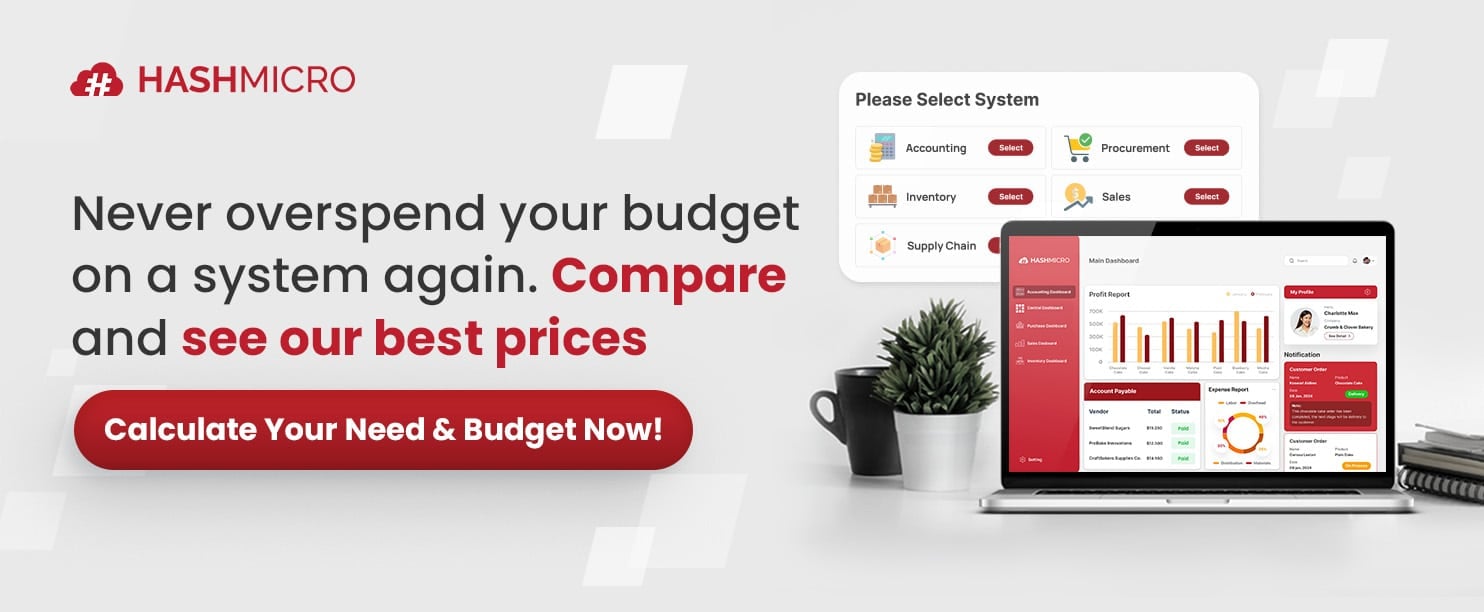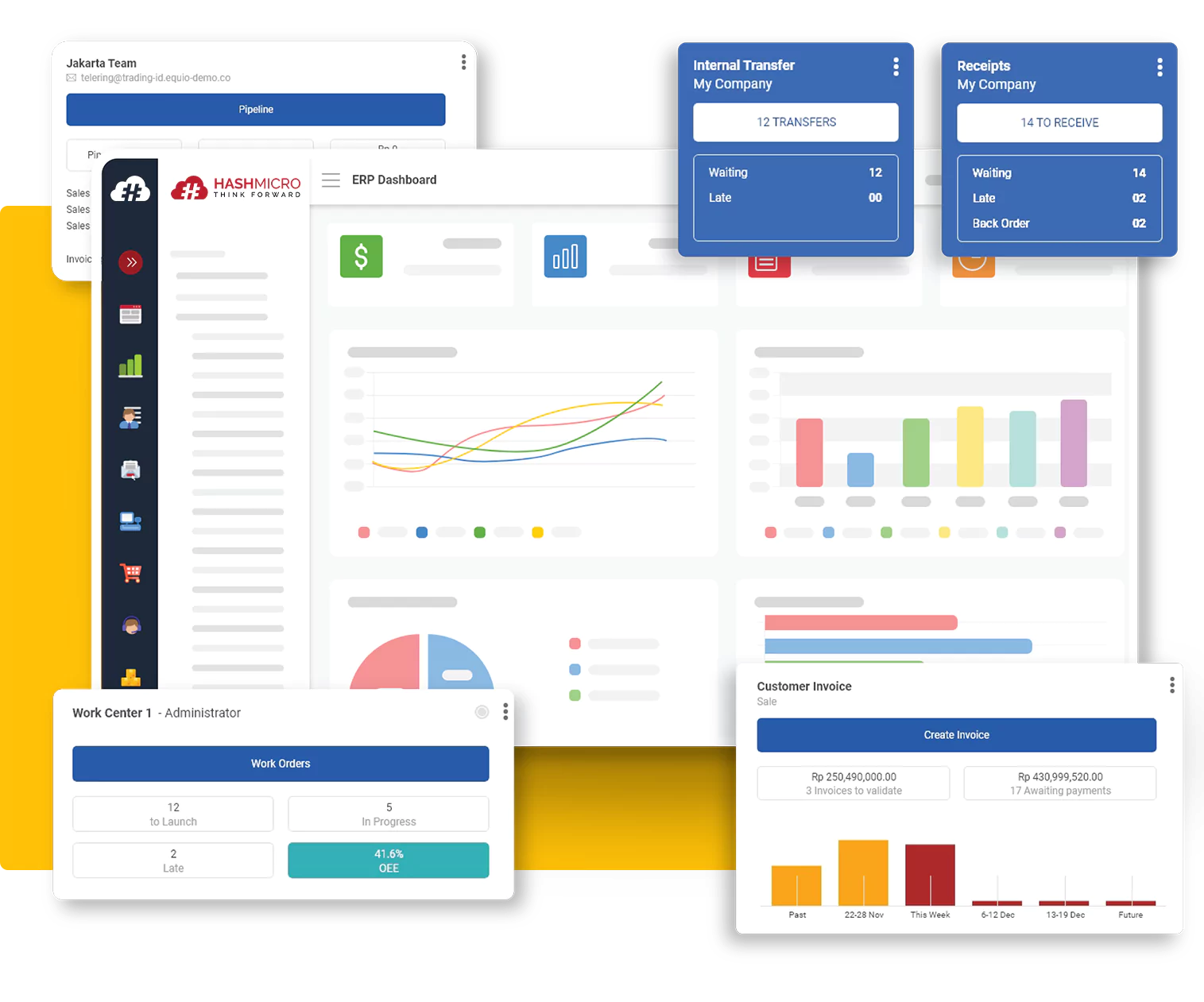Businesses in Malaysia may need help with their growth and operational efficiency. From outdated systems that slow down processes to data silos that obstruct informed decision-making, the need for a streamlined approach is clear.
This is where an Enterprise Resource Planning (ERP) system comes into play. According to a recent study, companies that implement ERP systems can experience up to a 49% increase in process efficiency. It offers a comprehensive solution designed to integrate and manage all core business processes.
An ERP system is software that combines numerous business functions into a unified system. It encompasses finance, HR, manufacturing, and supply chain management modules, allowing for real-time data accessibility and enhanced collaboration across departments.
As we delve deeper, let’s explore the ERP benefits that not only solve prevalent business issues but also propel Malaysian businesses toward sustained success.
Key Takeaways
|
Table of Content
Content Lists

How to Know if it’s Time for ERP Software?
Recognizing the right time to implement an ERP system can be pivotal for your business. Here are some signs that it might be time to consider an ERP solution:
- Times of Growth: Scaling your business often requires a system that can handle increased complexity without compromising performance.
- Issues with Operations: Frequent disruptions in operational processes are a clear sign that your existing systems may no longer suffice.
- Mergers or Acquisitions: Integrating multiple systems from different companies can be streamlined with an ERP system.
- Old Legacy Systems: Outdated software not only slows down your operations but also poses security risks.
- Strategic Roadmapping: Planning for the future is easier with a system that offers flexibility and scalability.
15 ERP Benefits and Advantages
In this section, we provide fifteen compelling ERP benefits and advantages, which can revolutionize the way businesses operate in Malaysia.
1. Centralized data in one system
Centralizing data is one of the key ERP benefits, ensuring that all business data is stored in one accessible location. This integration not only eliminates inconsistencies caused by multiple data sources but also enhances efficiency by providing a unified view of the business.
Furthermore, with centralized data, businesses can easily monitor and analyze their operations across various functions. This holistic view helps identify trends, pinpoint inefficiencies, and optimize processes across the businesses.
2. Data security guarantee
Another ERP benefits is data security guarantee. ERP systems are designed with strong security protocols that safeguard sensitive business information from unauthorized access and potential cyber threats.
Security measures also can be uniformly applied across all data and applications, reducing the risk of breaches that are more common in disparate systems.
In addition to external threats, ERP systems help manage internal data access with advanced user permissions and audit trails. These features ensure that only authorized personnel can access specific types of data and perform certain actions within the system.
3. Regulatory compliance
Staying compliant with ever-changing regulations can be a major challenge for businesses. ERP systems are invaluable in this regard, as they are updated regularly to reflect the latest legal requirements and standards of Malaysia regulations.
Moreover, benefits of ERP implementation are to provide comprehensive reporting features that make compliance auditing and reporting simpler and more transparent. They can generate reports that detail how business operations align with regulatory requirements, simplifying the audit process.
4. Enhance employee’s productivity

ERP systems significantly enhance human resource productivity by automating routine tasks across various departments, allowing employees to focus on more complex and value-added activities.
Automation is one of the benefits of ERP in business. It reduces the time spent on manual data entry, processing transactions, and managing paperwork, which are traditionally time-consuming. This shift not only speeds up operations but also minimizes human errors.
Furthermore, ERP systems improve workflow efficiency by providing tools that help in managing deadlines, reminders, and alerts automatically. These tools ensure that tasks are completed on time and important activities are not overlooked.
5. Scalability and visibility
ERP systems are inherently scalable. This means that as a business expands, whether by adding new product lines, increasing customer bases, or entering new markets, the ERP system can adjust to handle increased complexity and larger volumes of transactions.
Visibility is another benefits of ERP in business. They provide real-time visibility into every aspect of a business, from supply chain operations to financial transactions, enabling managers to make informed decisions quickly.
6. Operational cost saving
Benefits of ERP implementation is to streamline business operations and automate many of the labor-intensive tasks, which significantly reduces the manpower needed and minimizes human error. This leads to lower operational costs, as fewer resources are wasted on correcting mistakes and undertaking repetitive tasks.
Moreover, ERP system benefits are to reduce overhead costs by integrating various business functions into a single platform, eliminating the need for multiple software solutions, which also simplifies the IT infrastructure.
ERP systems also improve inventory management by providing accurate data on stock levels, reducing the need for holding excess inventory. This optimization helps avoid unnecessary storage costs and reduces the risk of spoilage or obsolete inventory.
7. In-depth reporting and analytics
ERP systems come equipped with advanced analytics and reporting tools that offer in-depth insights into every aspect of the business. These tools enable businesses to generate detailed reports on everything from financial performance to customer engagement, providing a comprehensive overview of business health.
The analytics capabilities of ERP systems also allow for predictive analytics, which helps businesses forecast future trends based on historical data. This capability can be particularly beneficial for areas like sales forecasting, budgeting, and resource allocation.
8. Mobile-friendly
The mobile-friendly nature of modern ERP systems means that business managers and employees can access the system and perform their tasks from anywhere, using their smartphones or tablets.
This flexibility is crucial where decisions often need to be made on the go. Mobile access to ERP systems ensures that all users have real-time data at their fingertips, enhancing responsiveness and decision-making speed.
Furthermore, mobile ERP applications improve employee productivity by enabling them to perform tasks outside of traditional office settings. Sales personnel can access customer data and update records from the field, while executives can approve workflows and monitor performance from any location.
9. Not dependent on an internet connection
HashMicro’s ERP system offers a unique benefit in that it does not rely on a constant internet connection to function effectively. This is particularly advantageous in areas with unreliable internet service, ensuring that business operations can continue without interruption.
ERP system benefits in HashMicro ERP system is the ability to operate offline also protects data integrity and system functionality during internet outages, reducing potential operational risks.
Moreover, the offline functionality ensures that data is synchronized once a connection is re-established, maintaining data accuracy and consistency. This feature is crucial for businesses that operate in remote or rural locations where internet connectivity is a challenge.
10. Cloud-based ERP system
The benefits of cloud ERP software are over traditional on-premise systems, including lower upfront costs, reduced IT maintenance burdens, and enhanced scalability. By hosting the ERP system in the cloud, businesses can avoid the large capital expenditures associated with setting up and maintaining hardware.
Additionally, cloud providers manage the IT infrastructure, ensuring that the system is always running on the latest technology and that security measures are up-to-date. The cloud-based approach also provides greater scalability, allowing businesses to easily add or remove users and features as their needs change.
11. Organized workflows and collaboration
ERP systems optimize workflows by automating business processes and establishing standardized procedures across departments. Workflow automation ensures that processes are carried out efficiently and consistently, which improves overall business performance and operational reliability.
The benefits of ERP in business enhance teamwork by providing tools that facilitate communication and information sharing among employees. This integration fosters a more cooperative environment and ensures that all team members are on the same page, reducing misunderstandings and improving project outcomes.
12. Enhance customer experiences

Enhancing customer experience is one of the ERP system benefits. ERP systems integrate customer information across different touchpoints, providing a 360-degree view of the customer journey. This perspective allows businesses to tailor their services and interactions based on comprehensive customer insights.
Enhanced customer experiences often result in higher satisfaction rates, increased loyalty, and more repeat orders. Moreover, with ERP systems, businesses can streamline customer service processes, reducing response times and improving communication.
13. Accurate forecasting
Another benefits of ERP system are equipped with advanced data analytics tools that enable precise forecasting, essential for manufacturing inventory management, workforce planning, and financial forecasting.
By analyzing historical data, ERP systems can predict future trends and demand patterns, helping businesses optimize their operations and resource allocation. Accurate forecasting reduces the risks of overstocking or understocking, which can tie up capital and affect sales respectively.
In addition to enhancing operational efficiency, accurate forecasting supports strategic planning by providing businesses with actionable insights. These insights enable companies to anticipate market shifts and adapt their strategies accordingly.
14. Increase efficiency and flexibility
ERP systems centralize business operations, which significantly enhances efficiency by reducing redundancy and automating routine tasks. This centralization allows for smoother workflow and quicker completion of processes, freeing up employees’ time for more strategic tasks that add value to the business.
Flexibility is another key benefits of ERP system, as they are designed to be modular and customizable. This means that businesses can select the modules that best fit their specific needs and integrate additional functionalities as their requirements evolve.
15. Unlimited users
One of the key benefits of ERP system from HashMicro is its offer of unlimited user access, which is not commonly provided by all ERP providers. This feature allows businesses to scale up their operations without worrying about additional user fees, which can become significant as the organization grows.
By eliminating per-user charges, HashMicro’s ERP system provides a cost-effective solution for businesses looking to expand their user base as they scale. Additionally, the unlimited user promotes inclusivity within the business by allowing full access to the ERP system for all employees who need it.
As the HashMicro ERP system provides complete features and maximum benefits for businesses in Malaysia, it’s a top choice if you’re considering adopting an ERP system. You can download the price scheme below and unlock the full potential of HashMicro ERP system.

Implementing ERP Systems in the Modern Business Era
Businesses today face complex challenges, including managing vast amounts of data, ensuring regulatory compliance, and maintaining seamless operations across multiple locations. An ERP system integrates various business processes into a single, cohesive platform, providing real-time insights and enhancing decision-making capabilities.
The modern business environment demands agility and responsiveness. An ERP system offers the flexibility to adapt quickly to market changes and customer demands. With advanced features like mobile accessibility and cloud-based solutions, ERP systems support remote work and global operations.
By adopting an ERP system, companies can leverage technological advancements to optimize their processes, foster innovation, and drive sustainable growth. This integration not only streamlines operations but also reduces costs and improves overall productivity.
Study Case: How ERP System Helps Businesses to Compete in the Malaysian Market

Proton Holdings Berhad, commonly known as Proton, is a major Malaysian automotive manufacturer. Founded in 1983, Proton has been a significant player in the automotive industry, contributing to Malaysia’s industrial and economic growth. However, Proton faced several challenges, including operational inefficiencies, high production costs, and stiff competition from global car manufacturers.
Proton’s legacy systems were fragmented, leading to data silos and inefficient business processes. The lack of integration between departments resulted in communication breakdowns, production delays, and difficulty in managing inventory. These issues hindered Proton’s ability to respond quickly to market demands and maintain competitive pricing.
To address these challenges, Proton implemented an ERP system designed to integrate all critical business functions. The ERP system centralized data from various departments, including manufacturing, finance, supply chain, and customer service, into a single platform.
The Results:
- Improved Inventory Management: The ERP system allowed Proton to optimize its inventory levels, reducing excess stock and associated holding costs. This improvement led to a more streamlined supply chain and better resource allocation.
- Enhanced Production Efficiency: By automating production schedules and monitoring manufacturing processes in real time, Proton increased its production efficiency. The system helped identify bottlenecks and areas for improvement, resulting in a 15% reduction in production time.
- Cost Savings: The centralized ERP system reduced administrative costs by automating many manual processes. The improved efficiency and inventory management contributed to significant cost savings, allowing Proton to remain competitive in pricing.
- Better Customer Service: With a unified view of customer interactions, Proton’s customer service team could provide more personalized and timely support. This enhancement improved customer satisfaction and loyalty, crucial in a competitive market.
- Regulatory Compliance: The ERP system ensured that Proton remained compliant with industry regulations and standards, reducing the risk of non-compliance penalties and enhancing the company’s reputation.
How to Choose The Right Modules of ERP System

Choosing the right ERP software involves understanding your specific business needs and aligning them with the right system. Below are important aspects you need to consider before choosing the suitable modules for your business.
- Pinpoint your business needs: Identify key areas where efficiency can be improved.
- Determine a budget: Understand your financial capacity for an ERP implementation.
- Analyze the overall functions of each module: Ensure that each module meets your specific business requirements.
- Choose an ERP system with a good reputation: Opt for systems like HashMicro that are known for reliability and robust support.
- Discuss with professional teams: Engage with ERP experts to tailor a system that best fits your business.
Conclusion
Implementing an ERP system can significantly transform your business operations. As demonstrated by Proton Holdings Berhad, the power of an integrated ERP system can revolutionize business operations, driving efficiency, reducing costs, and enhancing customer satisfaction.
For businesses in Malaysia looking to enhance efficiency and competitiveness, HashMicro offers a robust, flexible, and comprehensive ERP solution. With features such as unlimited user access, robust security, and cloud-based flexibility, HashMicro stands out as a premier choice for companies aiming to thrive in the modern business era.
If you’re curious about the full benefits of the HashMicro ERP system, you can discuss your business requirements with professional experts and try the free demo now!
FAQ About ERP Benefits
-
What is an ERP system?
An ERP (Enterprise Resource Planning) system is a software solution that integrates various business processes into one unified system. It helps organizations manage and automate core business functions like finance, HR, manufacturing, and supply chain management, streamlining operations and improving data accessibility.
-
How does an ERP system work?
An ERP system works by centralizing data and processes across different departments into a single database. This integration allows for real-time data updates and information sharing among all departments. By automating business processes and providing tools for data analysis and report generation, ERP systems enhance decision-making and operational efficiency.
-
What is the best ERP system in Malaysia?
The best ERP system in Malaysia is the HashMicro ERP system. It offers comprehensive features and scalability that cater to various business needs, ensuring operational efficiency and robust data security tailored to Malaysian market demands.




































